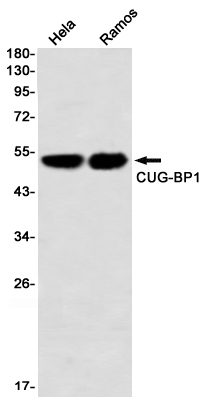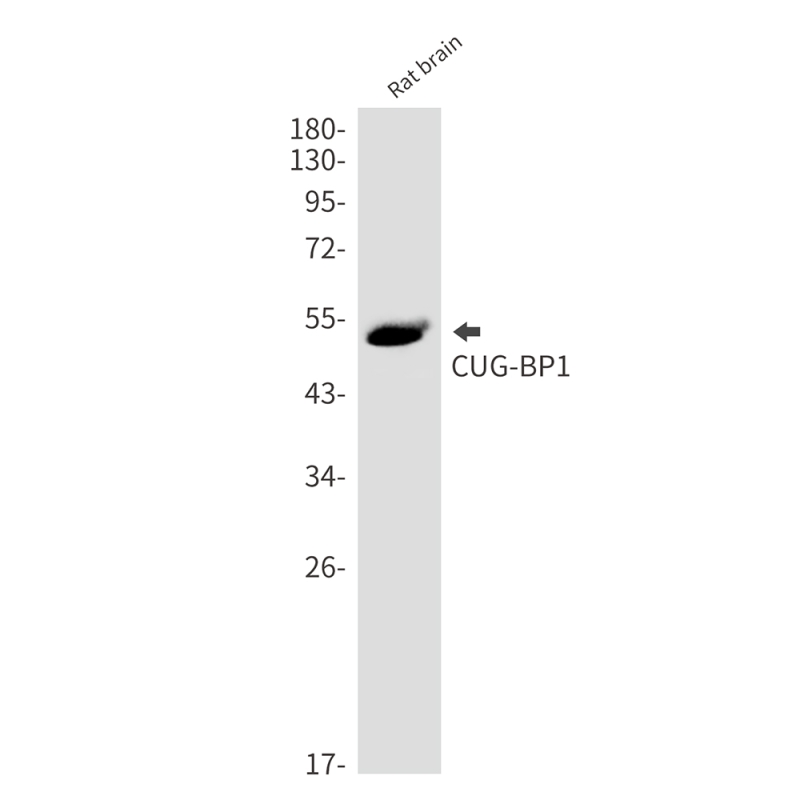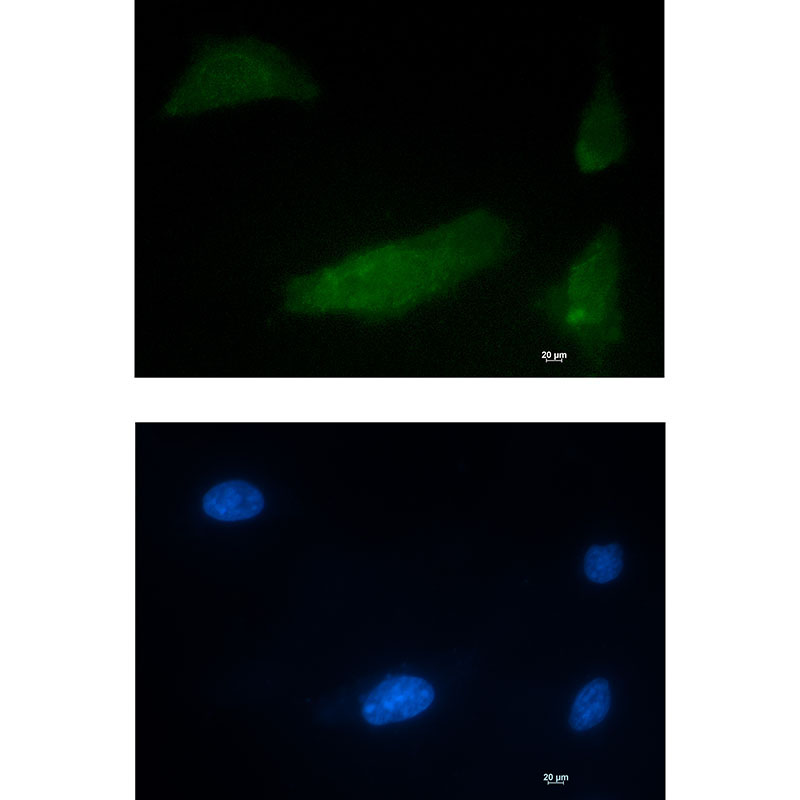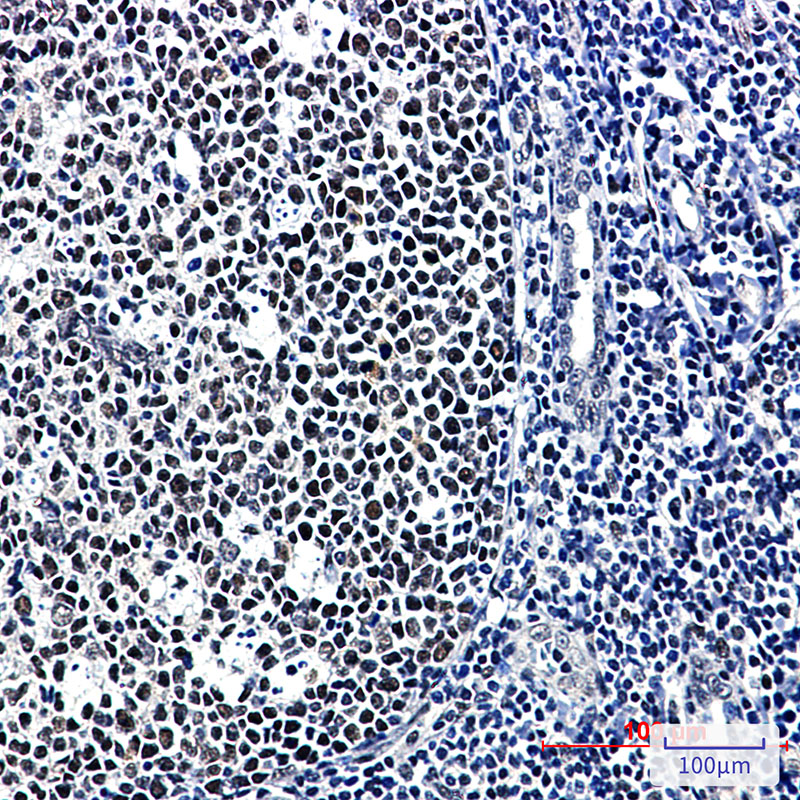



| WB | 1/500-1/1000 | Human,Mouse,Rat |
| IF | 1/20 | Human,Mouse,Rat |
| IHC | 1/50-1/100 | Human,Mouse,Rat |
| ICC | 1/50-1/200 | Human,Mouse,Rat |
| FCM | 咨询技术 | Human,Mouse,Rat |
| Elisa | 咨询技术 | Human,Mouse,Rat |
| Aliases | CELF1; BRUNOL2; CUGBP; CUGBP1; NAB50; CUGBP Elav-like family member 1; CELF-1; 50 kDa nuclear polyadenylated RNA-binding protein; Bruno-like protein 2; CUG triplet repeat RNA-binding protein 1; CUG-BP1; CUG-BP- and ETR-3-like factor 1; Dead |
| Entrez GeneID | 10658 |
| WB Predicted band size | Calculated MW: 52 kDa; Observed MW: 52 kDa |
| Host/Isotype | Rabbit IgG |
| Antibody Type | Primary antibody |
| Storage | Store at 4°C short term. Aliquot and store at -20°C long term. Avoid freeze/thaw cycles. |
| Species Reactivity | Human,Rat |
| Immunogen | A synthetic peptide of human CUG-BP1 |
| Formulation | Purified antibody in TBS with 0.05% sodium azide,0.05%BSA and 50% glycerol. |
+ +
以下是3篇关于CUGBP1抗体的代表性文献摘要(基于公开研究归纳,具体引用时请核实原文):
---
1. **文献名称**:*CUG-BP1 regulates RNA repeat-associated translation in myotonic dystrophy*
**作者**:Timchenko, N.A., et al.
**摘要**:该研究揭示了CUGBP1蛋白在肌强直性营养不良中通过结合CUG重复序列调控mRNA翻译的机制,使用CUGBP1抗体进行免疫共沉淀和Western blot验证其与RNA的相互作用及蛋白表达变化。
---
2. **文献名称**:*Overexpression of CUGBP1 in colorectal cancer and its role in tumor progression*
**作者**:Kuyumcu-Martinez, N.M., et al.
**摘要**:通过免疫组化与CUGBP1抗体检测,发现结直肠癌组织中CUGBP1显著过表达,并证实其通过调控靶基因剪接促进癌细胞增殖和侵袭。
---
3. **文献名称**:*Phosphorylation of CUGBP1 by AMPK regulates its stability and RNA-binding activity*
**作者**:Wang, H., et al.
**摘要**:研究利用CUGBP1抗体进行磷酸化特异性Western blot分析,发现AMPK介导的磷酸化修饰增强CUGBP1稳定性,进而影响其在细胞应激中的RNA结合功能。
---
**备注**:以上内容为领域典型研究方向概括,实际文献可能存在差异。建议通过PubMed或Google Scholar以关键词“CUGBP1 antibody”或“CUG-BP1”检索最新原文。
The CUG-BP1 (CUG triplet repeat RNA-binding protein 1), also known as CUGBP1 or CELF1. is an RNA-binding protein belonging to the CELF (CUGBP Elav-like family) protein family. It plays a critical role in post-transcriptional gene regulation, including mRNA splicing, stability, transport, and translation. CUG-BP1 binds to GU-rich elements in RNA, influencing processes such as alternative splicing of pre-mRNAs and regulating translation efficiency in response to cellular signals.
Research on CUG-BP1 gained prominence due to its involvement in myotonic dystrophy type 1 (DM1), a genetic disorder caused by CTG repeat expansions in the DMPK gene. In DM1. expanded CUG repeats sequester RNA-binding proteins like MBNL1. leading to dysregulation of CUG-BP1 activity. This imbalance disrupts RNA splicing and contributes to disease symptoms, including muscle wasting and cardiac defects.
Antibodies targeting CUG-BP1 are essential tools for studying its expression, localization, and interactions in both normal and pathological contexts. They are widely used in techniques like Western blotting, immunofluorescence, and immunoprecipitation to investigate its role in RNA metabolism, cellular stress responses, and diseases beyond DM1. such as cancer and neurodegenerative disorders. These antibodies have also facilitated the exploration of therapeutic strategies aimed at modulating CUG-BP1 activity to alleviate RNA splicing defects in genetic diseases.
×